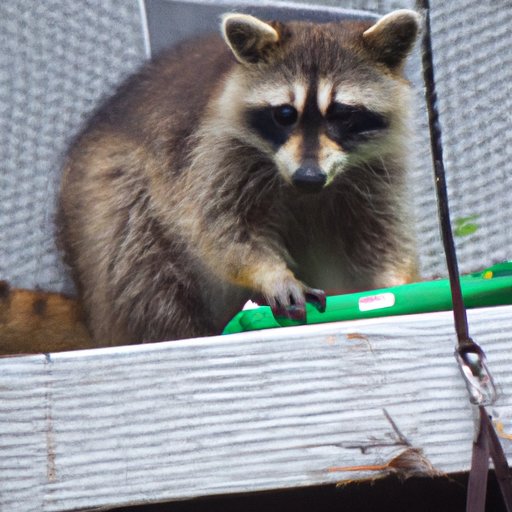
I. Introduction
Raccoons are cute, furry creatures that are unfortunately also notorious for invading homes and yards in search of food and shelter. While they may seem harmless, these pests can create a number of problems, from knocking over trash cans to damaging property or even spreading diseases. It’s important, then, to take steps to keep raccoons away and prevent them from causing any damage. In this article, we’ll explore some effective and eco-friendly solutions for keeping raccoons at bay.
II. Secure Your Trash Bins
One of the main reasons raccoons are attracted to homes and yards is the abundance of food sources, and one of the easiest targets is often with our trash. To prevent raccoons from rummaging through your trash cans, make sure they’re secure. This could mean using locking lids or bungee cords to tightly seal the cans. Additionally, take your garbage out on the morning of pickup rather than the night before, to reduce the amount of time raccoons have to find and access the cans.
III. Eliminate Other Food Sources
Raccoons are opportunistic feeders, which means they’ll eat pretty much anything they can get their paws on. To prevent raccoons from being drawn to your yard in the first place, it’s important to eliminate other potential food sources. This might include things like removing pet food bowls at night, feeding pets indoors, and promptly harvesting any fruits and vegetables from your garden. Additionally, try to ensure that outdoor grills are thoroughly cleaned and any leftover food is properly stored away.
IV. Install Motion-Activated Lights
Raccoons are active at night, so installing motion-activated lights can be an effective deterrent. When the lights turn on, they can startle raccoons and cause them to flee. Place the lights in strategic locations around your yard, such as near trash cans or entrance points, and be sure to adjust the sensitivity and range settings to ensure that they activate at the right moment. Motion-activated lights not only keep raccoons away, but can also be useful for general home security.
V. Use a High-Frequency Sound Repellent
Raccoons have very sensitive hearing, so another effective way to repel them is through high-frequency sounds. These sounds are imperceptible to humans, but can be uncomfortable and even painful for raccoons. There are a number of high-frequency sound repellents on the market, ranging from portable devices to permanent fixtures. Choose a sound repellent that fits your situation, and make sure to install it in areas where raccoons are likely to frequent.
VI. Create Physical Barriers
Physical barriers can be an effective way to prevent raccoons from entering your property altogether. This might include installing fences or using chicken wire to seal off certain areas of your yard. Raccoons are good climbers, so make sure that any barriers are tall enough (at least four feet) and angled outward at the top to prevent them from scaling the fence. You could also create a moat-like perimeter around your yard, filled with water to prevent raccoons from approaching.
VII. Use Natural Deterrents
For those who prefer a more eco-friendly solution, there are also a number of natural deterrents that can be effective against raccoons. These can range from simple smells (like cayenne pepper) or even planting certain herbs and plants as a natural repellent. These types of deterrents can be low-cost and easy to implement. However, it’s important to keep in mind that natural deterrents may not be 100% effective, and could have other effects on your property or the environment.
VIII. Conclusion
Ultimately, keeping raccoons away requires a multi-faceted approach. By securing your trash cans, eliminating other food sources, using motion-activated lights and high-frequency sound repellents, creating physical barriers and/or natural deterrents, you can significantly reduce the likelihood of raccoon invasions in your home and yard. Remember that taking preventative measures is key, and being proactive in keeping raccoons away will greatly reduce the chances of any unpleasant encounters with these pests.
It’s also worth noting that raccoons play an important role in the ecosystem, and that it’s important to respect these animals and their habitats. While they can certainly be a nuisance, taking steps to prevent run-ins with raccoons can be done humanely and without causing harm.




